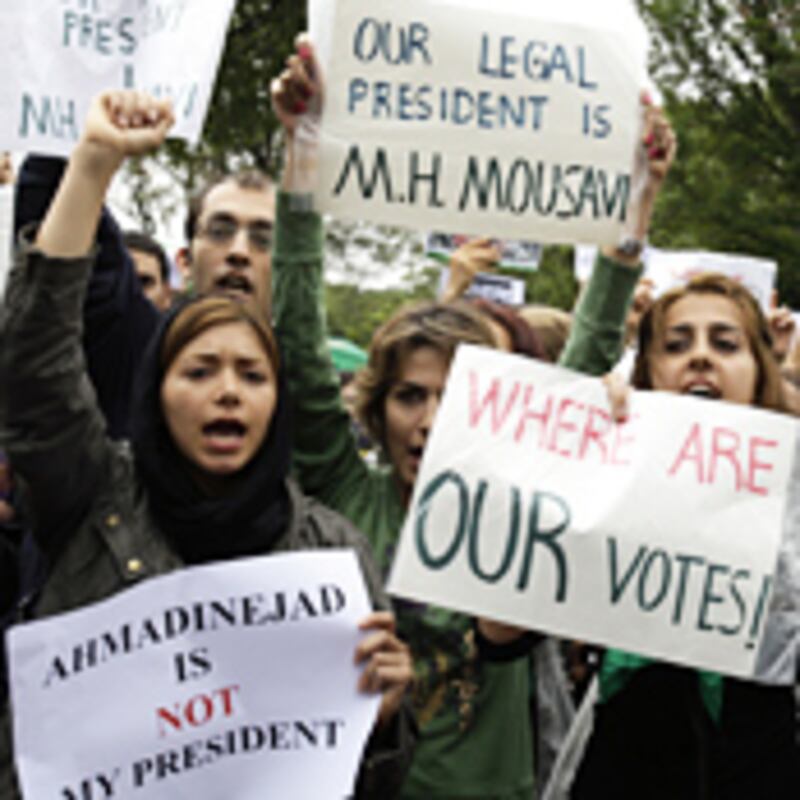
Plus, read more insight on Iran's election from other Daily Beast writers.
So let’s get this straight. We are supposed to believe that Mahmoud Ahmadinejad was reelected in Iran’s presidential election last week by a 2 to 1 margin against his reformist rival Mir Hossein Mousavi. That this deeply unpopular president, whose gross mismanagement of the state budget is widely blamed for Iran’s economy hovering on the edge of total collapse, received approximately the same percentage of votes as Mohammad Khatami, by far Iran’s most popular past president, received in both 1997 and 2001? That Mousavi, whom all independent polls predicted would at the very least take Ahmadinejad into a runoff election, lost not only his main base of support, Tehran, but also his own hometown of Khameneh in East Azerbaijan (which, as any Azeri will tell you, never votes for anyone but its own native sons)…and by a landslide. That we should all take the word of the Interior Ministry, led by a man put in his position by Ahmadinejad himself, a man who called the election for the incumbent before the polls were even officially closed, that the election was a fair representation of the will of the Iranian people.
Bullshit.
Such bald-faced election fraud is a totally new phenomenon in Iran, which takes its election process very seriously. This is, after all, the only expression of popular sovereignty that Iranians enjoy. Over and over again, the electorate has defied the will of the clerical regime when it comes to choosing the country’s president: in 1997 and 2001, when 70% of the population rejected the establishment candidate, Ali Akbar Nateq-Nouri, in favor of a completely unknown cleric, Khatami, whose greatest political contribution was as head of Iran’s National Library; and again in 2005 when Iranians rejected Hashemi Rafsanjani—the billionaire former president and the quintessential establishment candidate—to vote instead for a little-known mayor of Tehran named Mahmoud Ahmadinejad, who until that time had never run for any political office (Ahmadinejad was appointed mayor of Tehran after his predecessor was charged with corruption).
There is a genuine fear among these groups that Iran is beginning to resemble Egypt or Pakistan, countries in which the military controls the apparatus of government.
Indeed, despite what most Americans think, Iran boasts among of the freest and fairest presidential elections in the whole of the Middle East (a pathetic statement, but nevertheless true). Have there been examples of corruption and graft in previous elections? Yes, but not any more so than, say, in American elections. Are Iran’s presidential candidates vetted by an unelected Council of Guardians that filters out anyone it deems “unqualified” for the office? Yes, but this has partly to do with Iran’s strange elections laws, which allow practically anyone with a pulse to run for the office of president. This year, nearly 500 people ran for the post, some of them homeless, a few of them living in insane asylums. (It should be noted that a great many of these 500 candidates were women. The constitution of Iran uses a gender-neutral term to describe those who can run for the office of president, though in a blatantly unconstitutional act, the Council of Guardians, made up exclusively of men, automatically disqualifies all women from the post.) And while the Council’s decisions are obviously politically motivated, the truth is that the four candidates who qualified to run for president this year offered Iranian voters a greater diversity of political views than one sees in most American presidential elections.
Yet the brazenness with which this presidential election was stolen by Ahmadinejad’s supporters has caught everyone in Iran, even the clerical establishment, by surprise. Indeed, I am convinced that what we are witnessing in Iran is nothing less than a slow moving military coup against the clerical regime itself, led by Iran’s dreaded Revolutionary Guard, or Pasdaran, as the organization is called in Iran. The Pasdaran is a military-intelligence unit that acts independently from the official armed forces. Originally created by Ayatollah Ruhollah Khomeini to be the supreme leader’s personal militia, the Pasdaran has been increasingly acting like an independent agent over the last decade, one that appears to no longer answer to the current supreme leader, Ayatollah Ali Khamenei.
In 2005, the Pasdaran threw its support behind Ahmadinejad, a former member of the organization, and Ahmadinejad returned the favor by placing high-ranking Pasdaran members in important ministerial and ambassadorial posts in his administration. This was a complete departure from previous presidents—both conservatives and reformists—who went out of their way to keep the military out of the political realm. Today more than one-third of Iran’s parliament, or Majlis, are Pasdaran members, while the organization itself is thought to control nearly 30% of Iran’s economy through its oil, gas, real estate, and construction subsidiaries (the Pasdaran’s net worth is estimated to be between $12 billion and $15 billion).
It is the Pasdaran that controls Ahmadinejad, not the mullahs. Indeed, it was precisely fear of the Pasdaran’s rising political and economic influence that led to the “anybody but Ahmadinejad” coalition we saw in this election, wherein young, leftist students and popular reformists like Mohammad Khatami joined together with conservative mullahs and "centrists" like Rafsanjani to push back against what they consider to be the rampant militarization of Iranian politics. There is a genuine fear among these groups that Iran is beginning to resemble Egypt or Pakistan, countries in which the military controls the apparatus of government.
It is difficult to know how this coalition will react to Ahmadinejad’s “victory.” Thus far, their appeals to Ayatollah Khamenei to treat this stolen election as “an act of treason against the state,” which is how both Mousavi and Rafsanjani have described it, have fallen on deaf ears. What is abundantly clear, however, is that the days in which power in Iran rested in the hands of a single individual (the supreme leader) or a single group (the mullahs) are over. For better or worse, the new power base in Iran is the Pasdaran.
Reza Aslan, a contributor to the Daily Beast, is assistant professor of creative writing at the University of California, Riverside and senior fellow at the Orfalea Center on Global and International Studies at UC Santa Barbara. He is the author of the bestseller No god but Godand How to Win a Cosmic War.






